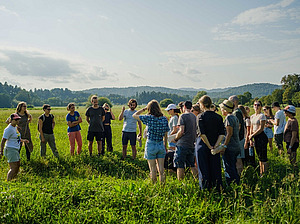"An annual summer school on the topic of agrobiodiversity"
Voices on biodiversity
Since 2019, FiBL and the ZHAW have organised an annual summer school for students on the topic of agrobiodiversity - each year in a different European country. (Photo: ZHAW, Fabienne Buchmann)
At the "Agrobiodiversity Summer School", a different group of students from all over Europe have been meeting every year since 2019 to take an in-depth look at the topic of agrobiodiversity. FiBL Switzerland, the Zurich University of Applied Sciences ZHAW and local partner institutions organise the summer school.
Agrobiodiversity encompasses the biodiversity that is important for agriculture and nutrition, as well as the biodiversity within landscapes shaped by humans.
Agrobiodiversity is, therefore, the basis for the production of diverse and nutritious food, but also for the breeding of new plant varieties and animal breeds. This diversity of livestock and crops strengthens the resilience of agricultural systems to climatic fluctuations, diseases and pests. Agrobiodiversity thus supports cultivation methods that are less resource-intensive and reduce external inputs such as pesticides.
Agrobiodiversity also enables the diversification of agricultural income sources, for example through the cultivation of innovative niche crops or the commercialisation of traditional foods. In rural regions, agrobiodiversity offers opportunities to improve livelihoods. The Food and Agriculture Organisation of the United Nations (FAO), therefore, emphasises that the sustainable use and conservation of agrobiodiversity is essential in order to overcome global challenges such as food insecurity, climate change and environmental degradation.
Summer school on the topic of agrobiodiversity
Unfortunately, the topic hardly plays a role in education and training. However, there are exceptions: Since 2019, FiBL and the ZHAW have organised an annual summer school for students on the topic of agrobiodiversity - each year in a different European country. The focus is not only on the diversity of biodiversity and production systems, but also on, for example, the diversity of marketing channels or the knowledge and skills of people who are committed to the sustainable use of agrobiodiversity.
During the ten-day summer school, local stakeholders present the importance of agrobiodiversity. This makes it concrete and tangible for the students.
In 2024, the Summer School was organised in cooperation with the University of Ljubljana in Slovenia. The students reported on the following places they visited in a blog:
Škocjanski zatok – A nature reserve is created
Over the last 30 years, a landfill site in the harbour of Koper has been transformed into a nature reserve. Before the harbour was built, the area was used as a vegetable garden and was known for its special flora and fauna. The expansion of the harbour destroyed a large part of this diversity. The memory of the lost nature motivated a small group to create a diverse habitat from the rubbish dump. Today, the area is a nature reserve and recreational area for the city of Koper. This impressive example shows that change can happen with vision and positive determination.
The karst region of Bela Krajina
Bela Krajina is home to the black olm (Proteus anguinus parkelj), a type of aquatic salamander which can grow up to 30 centimetres in size and was only scientifically described in 1986. The olm is endangered because it needs clean water and is sensitive to nitrogen pollution and pesticides. The students learnt how the local government, educational institutions, science and agriculture are working together to develop measures to keep the species in the region.
Coexistence in the Ljubljana Marshes
The Ljubljana Marshes Nature Park is an area of great agricultural and ecological importance that harbours endangered species. New regulations restricting agricultural activities and a lack of stakeholder involvement have led to resistance from farmers. The students developed proposals to improve cooperation between agriculture and nature conservation organisations and to ensure sustainable agriculture while protecting biodiversity.
Slovenian sea salt and biodiversity
Salt production is not agriculture, but it is committed to the careful utilisation of Slovenia's coastal landscape. Salt has been mined traditionally and with minimal equipment for 700 years, preserving unrivalled biodiversity and craftsmanship for generations. This example shows how the protection of biodiversity and the creation of local jobs can become a reality through cooperation between research, politics, tourism and other stakeholders.
As part of the summer school, other examples were visited, discussed with the stakeholders involved and reflected on in teams. While the Summer School was not designed to solve the larger issues of agriculture and tourism in the region, it did provide inspiration and food for thought for the students and local stakeholders involved, and gave the projects visited greater visibility.
The Summer School will take place again in 2025 - this time in Germany. Registration is still open until 16 February 2025.
Further information
Links
blog.zhaw.ch: Blog posts
fibl.org: News about Summer School 2025




